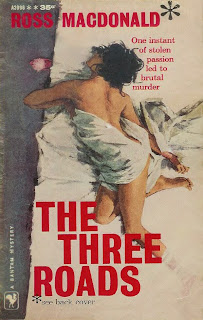Ross Macdonald's The Three Roads (Vintage Crime/Black Lizard), one of his early novels which had been long out of print, has recently being reissued along with several of his other more arcane works. The first edition hardcover dustjacket, pictured above, had an interesting Dali aspect to it, more in keeping with the consciousness of the novel than the sleazy sexual cover on the first paperback edition, pictured below.
The 1991 Bantam paperback edition had a much better cover: the lipstick on the suggestive cigarette smoking on the heart ashtray.
The title of The Three Roads is taken from Sophocles' Oedipus Tyrannus, and Macdonald overtly uses both the play and the Freudian interpretation of the myth in the novel, much more explicitly here than in his other novels. The title also suggests a metaphoric interpretation involving a trinity, and Macdonald gives us one in the text when a character waits in a new train station across from the old one:
"It seemed to her that the two buildings were symbols of historic forces. On the one hand was the giant mass of the power and utility companies that actually dominated the life of the state; on the other, the Spanish past that California plutocracy used to stucco its facade.'
"The shining metal streamliner waiting beside the station added the final touch to the allegory. It was the impossible future superimposed upon the ugly present in the presence of the regretted past. There was no continuity between the tenses, she thought. You passed from one to the other as a ghost passed through a wall, at the risk of your own reality."
Past, present, and future. Superego, ego, and id. The father, the son, and the holy ghost.
Mcdonald's protagonist has lost his past through amnesia. Like Oedipus in the myth, he has to piece together the mystery of the past piece by piece, not knowing whether it is best to know or not know, but compelled to do it in any case as if through fate. One of the doctors states the case as, "Past and present are so intertwined that you can't abandon the one without losing your grip on the other. Loss of the present is a fair definition of insanity."
As with the myth, the solving of the mystery of the past leads to unseen consequences and ironic implications. The book ends with the protagonist guilty but wiser, finally understanding that what he needs is not justice, but mercy.
A large amount of critical literature has naturally grown up around Ross Macdonald's works. Jerry Speir's Ross Macdonald
An excellent tandem read to Macdonald's The Three Roads is Salley Vickers' Where Three Roads Meet



